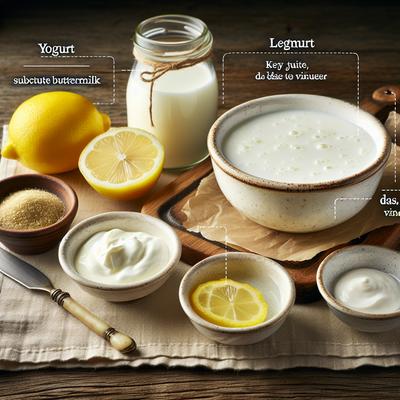Substitute Buttermilk
Create the perfect **buttermilk substitute** in just 5 minutes with this quick and simple recipe that requires only two everyday ingredients: **whole milk** and your choice of **white vinegar** or **lemon juice**. This DIY solution is ideal for those last-minute baking emergencies or when buttermilk isn’t on hand. By adding a touch of acidity to milk, you’ll achieve that same tangy flavor and creamy texture essential for everything from fluffy pancakes to rich biscuits. This no-cook method saves time without compromising on taste, making it an essential trick for home bakers. Perfect for cookies, cakes, marinades, and more, this homemade substitute is as versatile as it is easy.
Try SnapCalorie's FREE AI assisted nutrition tracking free in the App store or on Android.

Scan with your phone to download!

Ingredients
- 1 cup Whole milk
- 1 tablespoon White vinegar or lemon juice
Directions
Step 1
Measure 1 cup of whole milk and pour it into a small mixing bowl or liquid measuring cup.
Step 2
Add 1 tablespoon of white vinegar or fresh lemon juice to the milk.
Step 3
Stir the mixture well to combine.
Step 4
Let the mixture sit at room temperature for 5 minutes. The milk will begin to curdle slightly and thicken, resembling buttermilk.
Step 5
Stir again before using, and incorporate it into your recipe just like regular buttermilk.
Nutrition Facts
| Serving size | (259g) |
|---|
| Amount per serving | % Daily Value* |
|---|---|
| Calories | 151.5 |
| Total Fat 7.8g | 0% |
| Saturated Fat 4.5g | 0% |
| Polyunsaturated Fat 0.3g | |
| Cholesterol 29.3mg | 0% |
| Sodium 93.5mg | 0% |
| Total Carbohydrate 11.3g | 0% |
| Dietary Fiber 0g | 0% |
| Total Sugars 11.7g | |
| Protein 8.0g | 0% |
| Vitamin D 107.4IU | 0% |
| Calcium 301.0mg | 0% |
| Iron 0.0mg | 0% |
| Potassium 367.2mg | 0% |
Source of Calories
